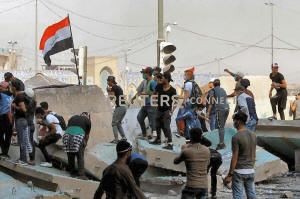|
The
protests that began on Oct. 1 were initially focused on a lack
of jobs and services but quickly morphed into denunciation of
the sectarian power-sharing system of government introduced in
2003 and the political elites they say benefit from it.
Security forces have used live ammunition, tear gas and stun
grenades against mostly young and unarmed protesters, killing
more than 280 people.
"The United States joins the UN Assistance Mission to Iraq in
calling on the Iraqi government to halt the violence against
protesters and fulfill President Salih's promise to pass
electoral reform and hold early elections," the White House
press secretary said in a statement posted by the U.S. embassy
in Baghdad on Monday.
Iraqi leaders agreed on Sunday that electoral reforms should
give more chance for young people to participate in politics and
break the monopoly on power of political parties that have
dominated state institutions since 2003, state media reported.
The unrest, the worst for two years, is one of the biggest and
most complicated challenges to the current ruling elite since it
took power after the U.S. invasion and toppling of autocrat
Saddam Hussein in 2003.
(Reporting by Raya Jalabi and Ahmed Aboulenein; Editing by
Catherine Evans)
[© 2019 Thomson Reuters. All rights
reserved.] Copyright 2019 Reuters. All rights reserved. This material may not be published,
broadcast, rewritten or redistributed.
Thompson Reuters is solely responsible for this content.

|
|






